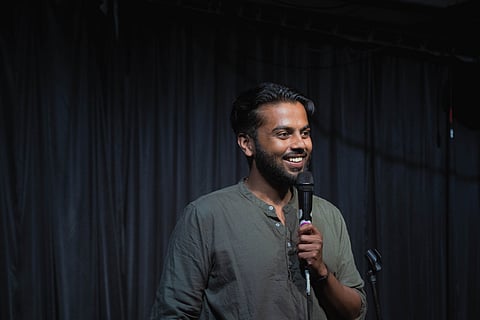When Sunthar toured across Chennai, Bengaluru and Mumbai, he was surprised to find similarities between local audiences and himself as a member of the Eelam Tamil diaspora. Photo courtesy: Sunthar V
Comment
Canadian-Tamil comedian Sunthar V navigates queerness and Tamil identity
Sunthar V, founder of the Tamil Comedy Club in central London, attempts to push social boundaries with his comedy in Chennai
Sunthar V doesn't expect to be everybody's comedian. But he is keen that you hear him out.
The 34-year-old queer Canadian-Tamil comedian, who founded the sellout show Tamil Comedy Club in central London in 2021, attempted to push social boundaries with his queer comedy while on a brief trip to Chennai.

